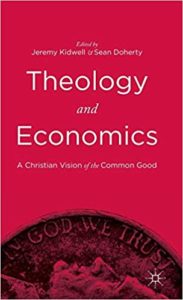
Theology and Economics: A Christian Vision of the Common Good
Reviewed by Kent W. Seibert, Economics and Business, Gordon College
What has theology to do with economics? No one doubts the importance of theology or economics, but the pair make for uncomfortable bedfellows. In an important collection of essays stemming from meetings of scholars from the Tyndale Fellowship Ethics and Social Theology Study Group and the Association of Christian Economists (UK), supported by the Kirby Laing Institute of Christian Ethics, editors Jeremy Kidwell and Sean Doherty seek “transdisciplinary collaboration” between theologians and economists. Pointing to the pervasiveness of economics in Christians’ daily lives, as well as the fallout from the Great Recession of 2008, Kidwell and Doherty rightly posit that theologians and Christian economists need to engage one another better. They acknowledge the difficulty of this using the adversarial imagery of swords and spears from Isaiah chapter 2 to describe how theologians and economists often relate to one another. But they also offer the hope of transformation that same chapter of Isaiah provides. In time, those swords and spears will be beaten into plowshares and pruning hooks.
How might [we] make use of the tools of economics and theological reasoning – which are too often wielded as swords of blame and recrimination against one another – into plowshares: tools that can be used jointly by Christian economists and theologians to cultivate more just and moral economies in the twenty-first century? (2)
Or how might theologians and economists work together to pursue the common good, an end which is of interest to both?
To address this question the editors arrange twelve essays produced by an array of accomplished economists and theologians into three sections. Each section also includes a response from yet another contributor. Continuing with the language of Isaiah 2, the first section of the book brandishes swords of critical engagement between economics and theology. The second and third sections provide plowshares in the form of resources for collaboration and visions of the common good. The essays’ authors have expertise primarily in either theology or economics, although at least four of the fifteen contributors have formal training in both theology and economics. The editors, Kidwell and Doherty, each contribute an essay and collaborate on the introduction and conclusion to the book. The methodology of the contributors varies widely, reflecting their disciplinary orientation, as well as their interest in contemporary issues or historical perspectives.
Following an introduction by the editors, the book begins with a strong chapter by economist and theologian Andy Hartropp describing the lack of awareness of just how difficult genuine engagement between theology and economics is, while also highlighting why the engagement is so challenging. Disciplinary overspecialization is a strong contributing factor. Economics and theology also begin with fundamentally different teleological and epistemological assumptions: “Christian economists and theologians have not been able to find or articulate an agreed basis for evaluating what is ‘good’” (20). And Hartropp emphasizes theologians’ lack of understanding of basic economic concepts. In chapter 2, economist Michael Pollitt thrusts the sword even deeper into theologians by listing six misconceptions he believes theologians have about economics and six positive contributions that economics makes to society, among other lessons theologians need to learn about economics. Pollitt concludes by admitting that economists also have much to learn: “Economics is a complex technical subject, so it would be surprising if theologians understood it fully. Just as it would be surprising if I understood academic theology!” (42).
In chapter 3, Eve Poole encourages theologians to consider first how they do theology before even beginning to consider the implications of theology for economics. She posits that in stepping back to examine their presuppositions, theologians would benefit from switching linguistic mood from realis to irrealis. This chapter continues the early tone of the book of how to accommodate theology to economics. Mark Chapman, in chapter 4, considers Red Toryism in the context of a multicultural and multi-traditional modern Britain, concluding that
while not without many attractive ideas, especially in relation to economic mutuality, Red Toryism as a program seems to be little more than another manifesto based on a fanciful historical narrative and a somewhat unrealistic (and perhaps anti-pluralist) sense of a common good rooted in a national history. (78)
The dominantly political nature of this chapter, although important in its own right, is less well suited to a book on economics and theology.
Malcom Brown delivers the response to the first four chapters of the initial section of the book, appropriately contesting Hartropp and Pollitt’s contention that theology bears most of the responsibility for the difficulty of reconciling economics and theology, which is not surprising coming from an Anglican priest:
Dialogue between economics and theology is hampered by hubris on one side and, I suspect, excessive timidity on the other. It will not progress far until economists understand that theological interventions are engagements in the discipline of political economy – a space that economists, too, have every right to enter but that they cannot assume to dominate. (88)
Section two of the book shifts from swords to plowshares, attempting to present possible resources for collaboration between theology and economics. Matthew Arbo, Andrew Henley, Jeremy Kidwell, and Sean Doherty write the chapters here. Arbo shares an interesting historical critique of Adam Smith’s theory of progress and considers the way Smith conflates that with moral progress, but leaves unanswered how much of this aspect of Smith’s thinking contemporary economists embrace. Henley offers virtue ethics as a possible Christian response to the utilitarianism of economics. His chapter represents a serious attempt to integrate economics with theology and Christian ethics. In his chapter on the social ethics of John of Chrysostom, Kidwell reminds readers that the Christian tradition, including patristics, has much to offer contemporary thinking on work, poverty, charity, business, and economics. Doherty argues the value of examining Christian economic ethics in relation to the Kingdom of God – including the Kingdom that is to come, but especially the one that already is. He seeks to offer hope in contrast to what he claims is the pessimistic outlook that Christianity and capitalism are incompatible. Paul Williams’s response to the chapters in this section begins by insightfully noting, “At first sight, these essays, as interesting as they are in their own right, seem only to belong in the same section of a volume on theology and economics on account of some very high order categorization” (157). Although he sees value in each essay, he laments that potential common ground has been unobserved or ignored.
The third section of the book continues to offer plowshares of potential reconciliation. Hans Ulrich leads off with a highly abstract discussion of economics and its limits. In chapter 12, Donald Hay and Gordon Menzies critique rational choice theory and offer their own intriguing alternative – mixed motive valuation model – which incorporates Christian assumptions regarding human motivation and behavior. They demonstrate that not all economists uncritically accept the premises of modern neo-classical economics and that Christianity provides meaningful ideas for developing a more accurate and biblically based view of people. Nicholas Townsend, in the following chapter, argues that there is a significant opportunity today to move from both traditional capitalism and socialism to a new form of capitalism which recognizes legal forms of businesses that allow for the pursuit of outcomes beyond profit maximization. Such forms have emerged recently as the “community interest company” in the United Kingdom and the “benefit corporation” in the United States providing evidence that more than just theologians and economists are interested in approaches to economic life that contribute to the common good in novel and holistic ways. Martyn Percy follows with an essay that contemplates how politics, economics, theology, and the church can join forces in promoting social flourishing. He concludes: “In many spheres of Christian engagement, of charity work and relief for the poor, capitalism has emerged as a partner within the framework of the solution, even if it remains part of the problem” (235). Oliver O’Donovan provides the response to the essays in part three. He notes the right and obligation of theology to speak into economic life, as well as the difficulty of integrating the two fields.
Editors Kidwell and Doherty conclude the book with a cogent summary of how swords might be turned into plowshares and what an agenda for continuing dialogue between these two diverse fields might look like.
Theology and Economics undertakes a much needed and difficult assignment. The success with which the assignment is completed is uneven across the essays. An example: when one author strangely attributes the recent problems of Greece’s economy to the limits of capitalism, we see that some very basic principles of capitalism are still grossly misunderstood. No doubt a reader deeply versed in theology would see counter-misunderstandings expressed by the economist authors. But perhaps that is the point of the book. This assignment is extremely complex. Essays co-authored by an economist and a theologian, of which there were none, seem needed if the book is serious about the transdisciplinary (versus simply multidisciplinary) approach it espouses. Further, the approach to theology is overly narrow for the first three-quarters of the book until Roman Catholic, Anabaptist, and liberation theology are finally mentioned. Ample resources exist in these areas, including the works of James Halteman1 and Thomas O’Brien, Elisabeth Collier, and Patrick Flanagan,2 just to name two. Perhaps the book’s title is overly ambitious, referring to theology without specifying the form of theology it emphasizes. By the end of the book, I was left feeling that the chasm between theology and economics remains. I was also left thinking that shalom, rather than swords and spears, might be a more constructive metaphor to encourage reconciliation. Even so, the book is to be commended for at least attempting a vital assignment that too many either ignore or fear.























